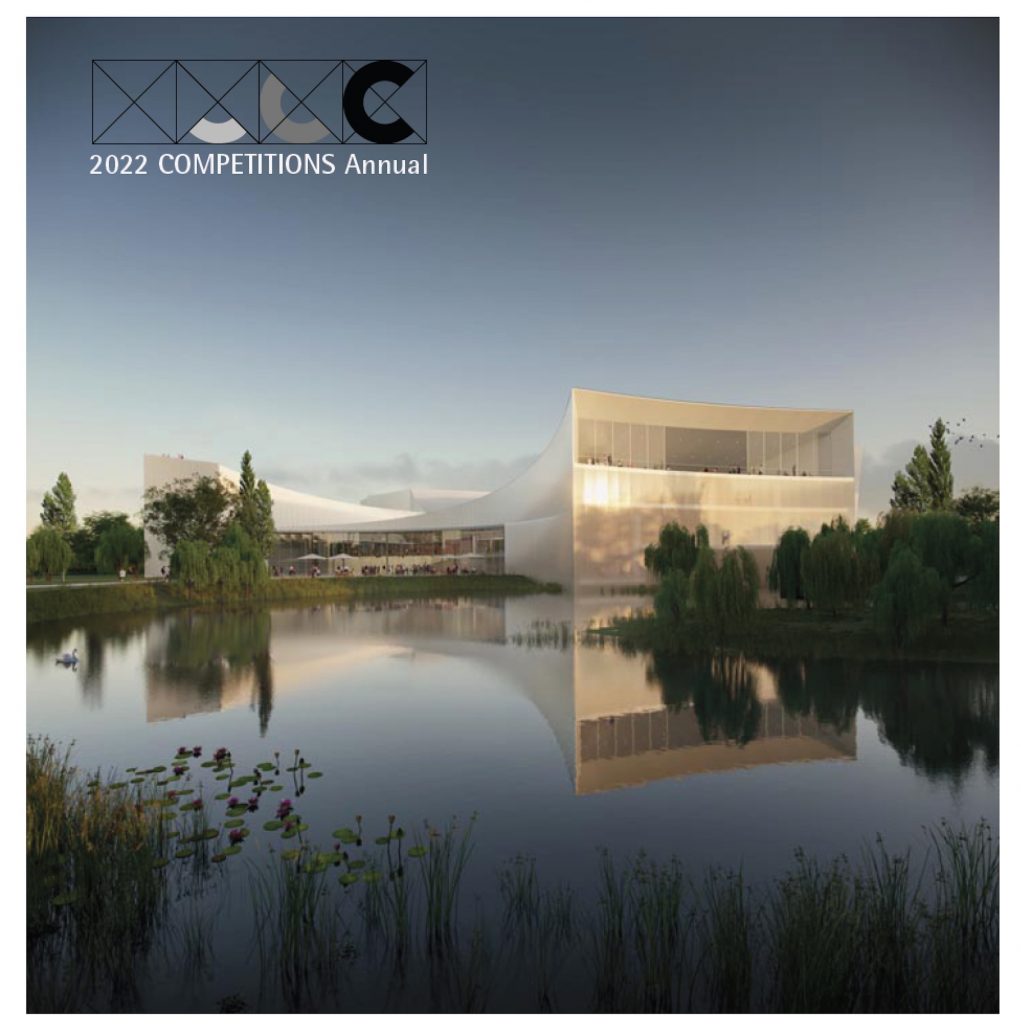The New Jongno-gu Government Complex Design Competition
Sponsor: Seoul Metropolitan Government Jongno-gu
Location: Seoul, South Korea
Type: Open, international
Language: Korean, English
Fee: None
Eligibility: Both Korean and foreign licensed architects can participate, and one team can be made of up to three architects but one appointed representative should carry out the registration.
Timetable:
20 August 2020 – Registration deadline
27 August – Submission deadline
Honoraria:
First Prize – Commission to develop design
Second Prize – 80,000,000 KRW (about $66,700 US)
Third Prize – 60,000,000 KRW (about $50,000 US)
Fourth Prize – 40,000,000 KRW (about $33,300 US)
Fifth Prize – 20,000,000 KRW (about $17,000 US)
Jury:
• Kim Dong-Jin – Hongik University / architecture
• Yongmi Kim – GEUMSUNG Architects & Associates
• Junsung, Kim – Graduate school of architecture, Konkuk University / architecture
• Insoo Park – PARKiz
• Hyun Seo – Seoul Nat'l Univ.
• Na-Kyoung Yu – Principal, Place Making Associates Co.
• Kwanseok Lee – Kyung Hee University
• Kiok Lee – PHILLIP Architects
• Chung Kee Lee – University of Seoul
• KIM, Hyundai – Preparatory Jury
Design Challenge:
This competition aims to select a future-oriented and sustainable proposal for the governmental office complex that will accommodate both memory of the past as well as futuristic creativity. It will be constructed on the current Jongno-gu Office site which has many historical and cultural layers in order to enhance working efficiency and to create a public and community space for residents of Jongno-gu.
The site of the Jongno-gu Office is of great historical value. It is presumed to be the home of Jeong Do-jeon, a founding contributor of the Joseon Dynasty. In addition, several historical and cultural resources and historical spaces linked to both the Joseon and modern eras are concentrated and distributed around this area. On the east side of the site are modern middle and high-rise buildings, and beyond that are buildings that maintain the traditional architecture and horizontal form of the Joseon Dynasty.
Site summary:
• Site Area: 8,622.3m²
• Total Floor Area: 66,970m² (Total Floor Area and each program area can be changed within ±3% of required area)
• Estimated construction cost: KRW 168,161 million (approx $140,428,520 US)
• Design Cost: KRW 8,904 million, including VAT and Securities for Damage Liability (approx $7,436,950 US)
Available Materials:
The following materials are provided on official website and only registered entrants can have access: •Design Competition Guidelines (Korean and English)
•[Attachment] Detailed Guideline of Programs (Korean and English) •Forms (design description cover form, relevant documents, etc.)
•Task Instruction (Korean)
•Project Site Digital Map
•Site Survey Drawing (* Surveyed as of 2015, and the surrounding condition may differ slightly)
•Drawings of main building of Jongno-gu Office (plan, elevation, section, and structural plan)
•Safety Inspection Report of main building (Korean)
•Abbreviated report on the first and second drilling investigation of buried cultural properties (Korean)
•Maintenance plan decision
•Breakdown on design service cost
•Report on the actual status of preservation values including signboards and monuments (Korean)
•Drawings of temporary land dividing line
•Link to the project site of the 3D spatial information system in Seoul https://vo.la/X1R8
•Construction Documents for underground public pedestrian passage connected to Gwanghwamun Station related to Urban Environment Improvement Project in Cheongjin District Submission of Entries:
Each entry can submit only one design entry. Both digital and physical materials are required:
• Digital Submission: All entries are to be submitted as digital files on official website (http://project.seoul.go.kr) within the deadline.
• Submission by personal delivery or per post: All entries and models should be submitted by personal delivery or per post to the designated submission address within the deadline. Materials include full size projects boards and a scale model. For more information, go to: project.seoul.go.kr
|
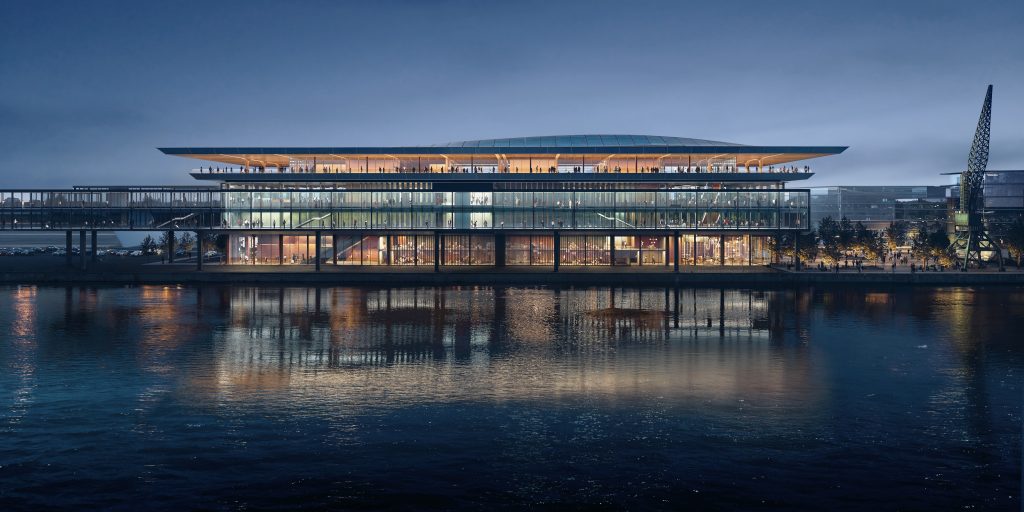
1st Place: Zaha Hadid Architects – night view from river – Render by Negativ
Arriving to board a ferry boat or cruise ship used to be a rather mundane experience. If you had luggage, you might be able to drop it off upon boarding, assuming that the boarding operation was sophisticated enough. In any case, the arrival experience was nothing to look forward to. I recall boarding the SS United States for a trip to Europe in the late 1950s. Arriving at the pier in New York, the only thought any traveler had was to board that ocean liner as soon as possible, find one’s cabin, and start exploring. If you were in New York City and arriving early, a nearby restaurant or cafe would be your best bet while passing time before boarding. Read more… Young Architects in Competitions When Competitions and a New Generation of Ideas Elevate Architectural Quality 
by Jean-Pierre Chupin and G. Stanley Collyer
published by Potential Architecture Books, Montreal, Canada 2020
271 illustrations in color and black & white
Available in PDF and eBook formats
ISBN 9781988962047
Wwhat do the Vietnam Memorial, the St. Louis Arch, and the Sydney Opera House have in common? These world renowned landmarks were all designed by architects under the age of 40, and in each case they were selected through open competitions. At their best, design competitions can provide a singular opportunity for young and unknown architects to make their mark on the built environment and launch productive, fruitful careers. But what happens when design competitions are engineered to favor the established and experienced practitioners from the very outset? This comprehensive new book written by Jean-Pierre Chupin (Canadian Competitions Catalogue) and Stanley Collyer (COMPETITIONS) highlights for the crucial role competitions have played in fostering the careers of young architects, and makes an argument against the trend of invited competitions and RFQs. The authors take an in-depth look at past competitions won by young architects and planners, and survey the state of competitions through the world on a region by region basis. The end result is a compelling argument for an inclusive approach to conducting international design competitions. Download Young Architects in Competitions for free at the following link: https://crc.umontreal.ca/en/publications-libre-acces/ 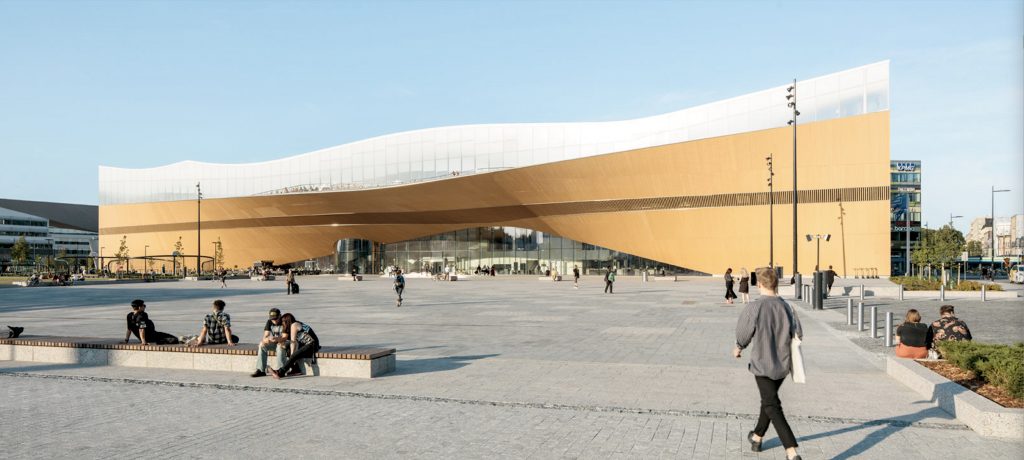
Helsinki Central Library, by ALA Architects (2012-2018)
The world has experienced a limited number of open competitions over the past three decades, but even with diminishing numbers, some stand out among projects in their categories that can’t be ignored for the high quality and degree of creativity they revealed. Included among those are several invited competitions that were extraordinary in their efforts to explore new avenues of institutional and museum design. Some might ask why the Vietnam Memorial is not mentioned here. Only included in our list are competitions that were covered by us, beginning in 1990 with COMPETITIONS magazine to the present day. As for what category a project under construction (Science Island), might belong to or fundraising still in progress (San Jose’s Urban Confluence or the Cold War Memorial competition, Wisconsin), we would classify the former as “built” and wait and see what happens with the latter—keeping our fingers crossed for a positive outcome. Read More… 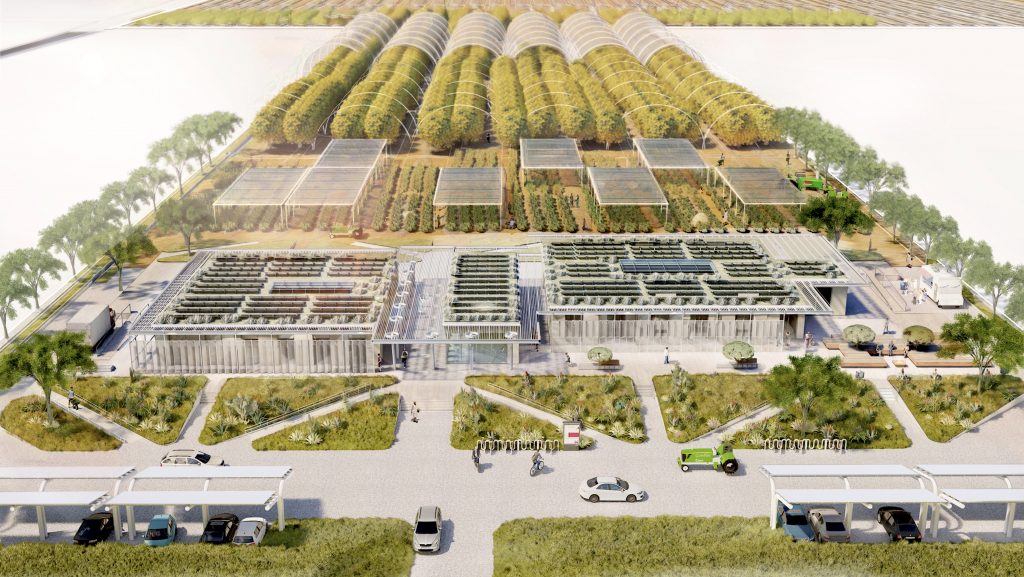
2023 Teaching and Innovation Farm Lab Graduate Student Honor Award by USC (aerial view)
Architecture at Zero competitions, which focus on the theme, Design Competition for Decarbonization, Equity and Resilience in California, have been supported by numerous California utilities such as Southern California Edison, PG&E, SoCAl Gas, etc., who have recognized the need for better climate solutions in that state as well as globally. Until recently, most of these competitions were based on an ideas only format, with few expectations that any of the winning designs would actually be realized. The anticipated realization of the 2022 and 2023 competitions suggests that some clients are taking these ideas seriously enough to go ahead with realization. Read more… 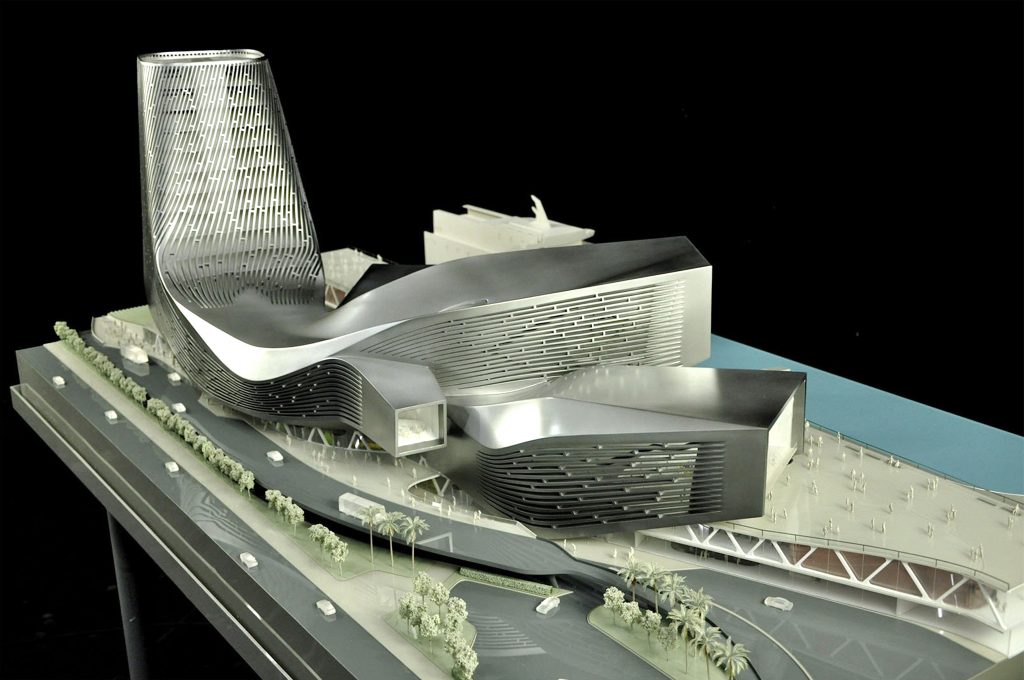
RUR model perspective – ©RUR
New Kaohsiung Port and Cruise Terminal, Taiwan (2011-2020)
Reiser+Umemoto RUR Architecture PC/ Jesse Reiser – U.S.A.
with
Fei & Cheng Associates/Philip T.C. Fei – R.O.C. (Tendener)
This was probably the last international open competition result that was built in Taiwan. A later competition for the Keelung Harbor Service Building Competition, won by Neil Denari of the U.S., the result of a shortlisting procedure, was not built. The fact that the project by RUR was eventually completed—the result of the RUR/Fei & Cheng’s winning entry there—certainly goes back to the collaborative role of those to firms in winning the 2008 Taipei Pop Music Center competition, a collaboration that should not be underestimated in setting the stage for this competition Read more… 
Winning entry ©Herzog de Meuron
In visiting any museum, one might wonder what important works of art are out of view in storage, possibly not considered high profile enough to see the light of day? In Korea, an answer to this question is in the making. It can come as no surprise that museums are running out of storage space. This is not just the case with long established “western” museums, but elsewhere throughout the world as well. In Seoul, South Korea, such an issue has been addressed by planning for a new kind of storage facility, the Seouipul Open Storage Museum. The new institution will house artworks and artifacts of three major museums in Seoul: the Seoul Museum of Modern Art, the Seoul Museum of History, and the Seoul Museum of Craft Art.
Read more… |



























